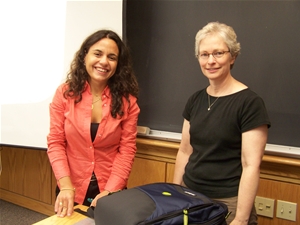Algebraic Geometry at Park City Mathematics Institute (https://pcmi.ias.edu/application-ugss)
Category: Uncategorized
Distinguished Visiting Professor Talk Series: Sergi Elizalde, Dartmouth College, November 24th @4pm in Olin 372
Title: Consecutive patterns in permutations
Abstract: An occurrence of a consecutive pattern sigma in a permutation pi
is a subsequence of adjacent entries of pi in the same relative
order as the entries of sigma. For example, occurrences of the
consecutive pattern 21 are descents, and alternating permutations
are those that avoid the consecutive patterns 123 and 321. The
systematic study of consecutive patterns in permutations started over
a decade ago. More recently, consecutive patterns have become
relevant in the study of one-dimensional dynamical systems, and they
are useful in creating tests to distinguish random from deterministic
time series.
We show that the number of permutations avoiding the consecutive
pattern 12…m —that is, containing no m adjacent entries in
increasing order— is asymptotically larger than the number of
permutations avoiding any other consecutive pattern of length m. At
the other end of the spectrum, the number of permutations avoiding
12… (m-2)m(m-1) is asymptotically smaller than for any other
consecutive pattern.
Problem of the Week Instructions and This Week’s Problem
Try the Math Department Problem of the Week!
New Problems every Tuesday at 1pm!
How it Works:
- Pick up a problem sheet in the Math Department on the third floor of Olin Science
- Do the problem!
- Turn in your solution in the Math Dept. Office in Olin 380 before 5pm the following Monday.
- Every correct solution over the course of the semester gives you a chance to win a $50 Amazon Gift Card.
- Keep doing the Problem of the Week! Each correct solution adds your name to the drawing at the end of the semester!
2 correct solutions = 2 tickets in the drawing!
Problem of the Week #4:
Distinguished Visiting Professor Talk Series: Eva A. Gallardo Gutierrez, Universidad Complutense de Madrid, October 23rd @ 4pm in Olin 372
Title: Rota’s Universal Operators
Abstract: The Invariant Subspace Problem for Hilbert spaces is a long-standing question and the use of universal operators in the sense of Rota has been one tool for studying the problem. The best known universal operators have been adjoints of analytic Toeplitz operators or unitarily equivalent to them. We present many examples of Toeplitz operators whose adjoints are universal operators and exhibit some of their common properties. Some ways in which the invariant subspaces of these universal operators interact with operators in their commutants are given. Special attention is given to the closed subalgebra, not always the zero algebra, of compact operators in their commutants.
